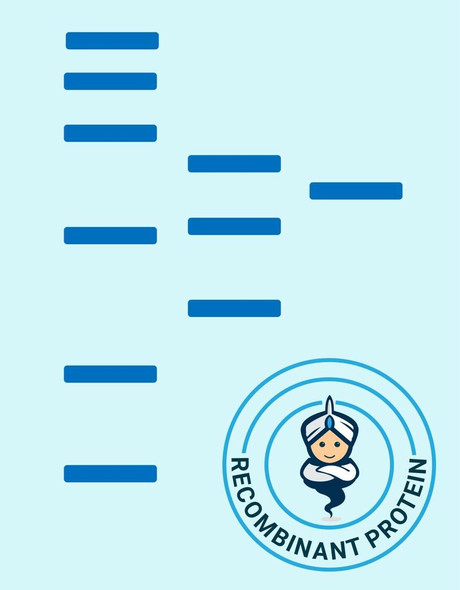Canine Clusterin Recombinant Protein (RPPB5720)
- SKU:
- RPPB5720
- Product type:
- Recombinant Protein
- Size:
- 10ug
- Species:
- Canine
- Target:
- Clusterin
- Synonyms:
- CLI
- AAG4
- KUB1
- SGP2
- Source:
- Human Embryonic Kidney 293 Cells
- Uniprot:
- P25473
Description
| Product Name: | Canine Clusterin Recombinant Protein |
| Product Code: | RPPB5720 |
| Size: | 10µg |
| Species: | Canine |
| Target: | Clusterin |
| Synonyms: | CLI, AAG4, KUB1, SGP2, SGP-2, SP-40, TRPM2, MGC24903, Clusterin, Glycoprotein 80, Gp80, CLU. |
| Source: | Human Embryonic Kidney 293 Cells |
| Physical Appearance: | Filtered White lyophilized (freeze-dried) powder. |
| Formulation: | Canine Clusterin was filtered (0.4µm) and lyophilized from 0.5mg/ml solution containing 20mM Tris buffer and 20mM NaCl, pH 7.5. |
| Solubility: | It is recommended to add deionized water to prepare a working stock solution of approximately 0.5mg/ml and let the lyophilized pellet dissolve completely. Product is not sterile! Please filter the product by an appropriate sterile filter before using it on cell culture. |
| Stability: | Store lyophilized protein at -20°C. Aliquot the product after reconstitution to avoid repeated freezing/thawing cycles. Reconstituted protein can be stored at 4°C for a limited period of time; it does not show any change after two weeks at 4°C. |
| Purity: | Greater than 95% as determined by SDS PAGE. |
| Amino Acid Sequence: | PGDYKDDDDK PAGDQAVSDT ELQEMSTEGS KYINKEIKNA LKGVKQIKTL IEQTNEERKS LLSNLEEAKK KKEDALNDTK DSETKLKASQ GVCNDTMMAL WEECKPCLKQ TCMKFYARVC RSGSGLVGHQ LEEFLNQSSP FYFWMNGDRI DSLLENDRQQ THALDVMQDS FNRASSIMDE LFQDRFFTRE PQDTYHYSPF SLFQRRPFFN PKFRIARNII PFPRFQPLNF HDMFQPFFDM IHQAQQAMDV NLHRIPYHFP IEFPEEDNRT VCKEIRHNST GCLKMKDQCE KCQEILSVDC SSNNPAQVQL RQELSNSLQI AEKFTKLYDE LLQSYQEKMF NTSSLLKQLN EQFSWVSQLA NLTQSEDPFY LQVTTVGSQT SDSNVPVGFT KVVVKLFDSD PITVMIPEAV SRNNPKFMET VAEKALQEYRQKHREE |
Clusterin mRNA and Clusterin protein are shown to increase with androgen treatment. Binding of clusterin to the LDL-Receptor plays a role in the pathogenesis of membranous glomerulonephritis. Clusterin is down regulated in CaP in association with matched benign controls. Clusterin is involved in cellular senescence and tumorigenesis. Clusterin is involved in photo-oxidative cell death pathway. Clusterin is a functional tumor marker for the diagnosis of pediatric large cell lymphoma. Clusterin is activated in low pH. Clusterin is involved in the inhibition of NF-kappaB signaling through stabilization of IkappaBs thus results in suppression of tumor cell motility. N-terminal deletion of clusterin is vital for its alterations of biogenesis in esophageal squamous cell carcinoma.
Clusterin Canine Recombinant produced in HEK293 cells is a glycosylated, Polypeptide chain containing 436 amino acids and having a molecular mass of 50.72 kDa. The protein is fused with 13 amino acid Flag tag at N-Terminus.The Apolipoprotein-J Canine is purified by proprietary chromatographic techniques.
| UniProt Protein Function: | Functions as extracellular chaperone that prevents aggregation of nonnative proteins. Prevents stress-induced aggregation of blood plasma proteins. Inhibits formation of amyloid fibrils by APP, APOC2, B2M, CALCA, CSN3, SNCA and aggregation-prone LYZ variants (in vitro). Does not require ATP. Maintains partially unfolded proteins in a state appropriate for subsequent refolding by other chaperones, such as HSPA8/HSC70. Does not refold proteins by itself. Binding to cell surface receptors triggers internalization of the chaperone-client complex and subsequent lysosomal or proteasomal degradation. When secreted, protects cells against apoptosis and against cytolysis by complement. Intracellular forms interact with ubiquitin and SCF (SKP1-CUL1-F-box protein) E3 ubiquitin-protein ligase complexes and promote the ubiquitination and subsequent proteasomal degradation of target proteins. Promotes proteasomal degradation of COMMD1 and IKBKB. Modulates NF-kappa-B transcriptional activity. Promotes apoptosis when in the nucleus. Inhibits apoptosis when associated with the mitochondrial membrane by interference with BAX-dependent release of cytochrome c into the cytoplasm. Plays a role in the regulation of cell proliferation (). |
| UniProt Protein Details: | |
| NCBI Summary: | This gene encodes a protein that is similar to the human clusterin protein, a secreted chaperone that can also be found in the cell cytosol under certain stress conditions. The human protein has been suggested to be involved in several basic biological events such as cell death, tumor progression, and neurodegenerative disorders. [provided by RefSeq, May 2011] |
| UniProt Code: | P25473 |
| NCBI GenInfo Identifier: | 50979240 |
| NCBI Gene ID: | 442971 |
| NCBI Accession: | NP_001003370.1 |
| UniProt Secondary Accession: | P25473 |
| UniProt Related Accession: | P25473 |
| Molecular Weight: | 51,790 Da |
| NCBI Full Name: | clusterin |
| NCBI Synonym Full Names: | |
| NCBI Official Symbol: | CLU |
| NCBI Official Synonym Symbols: | GP80 |
| NCBI Protein Information: | clusterin |
| UniProt Protein Name: | Clusterin |
| UniProt Synonym Protein Names: | Glycoprotein 80; Gp80 |
| Protein Family: | Clusterin |
| UniProt Gene Name: | CLU |
| UniProt Entry Name: |









